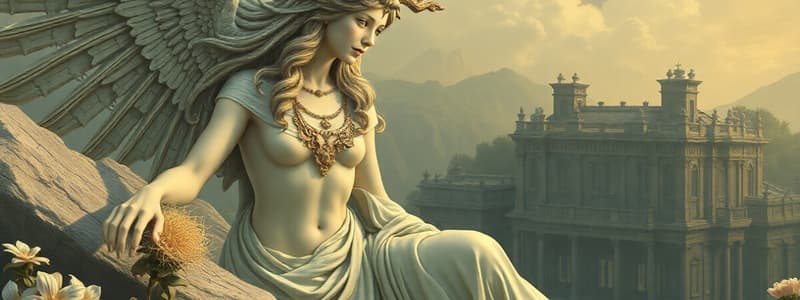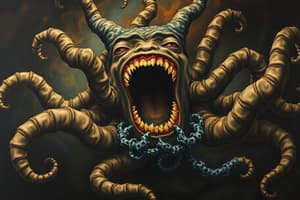Podcast
Questions and Answers
What characteristic is essential in distinguishing myths from other narrative forms like legends and folktales?
What characteristic is essential in distinguishing myths from other narrative forms like legends and folktales?
- Myths are created solely for entertainment purposes.
- Myths must be narrated in written form only.
- Myths primarily focus on the relationship between gods and humankind. (correct)
- Myths are always based on true historical events.
In what way do myths provide unity according to the provided definitions?
In what way do myths provide unity according to the provided definitions?
- By promoting historical accuracy in narratives.
- By confirming scientific facts through empirical evidence.
- By eliminating all forms of ambiguity and confusion.
- By presenting philosophical visions and cultural experiences. (correct)
Which statement best describes the relationship between myth and religion?
Which statement best describes the relationship between myth and religion?
- Myth supports religious beliefs and provides a basis for rituals and ceremonies. (correct)
- Myth negates the need for belief in a higher power.
- Myth and religion are entirely separate concepts with no overlap.
- Myth exclusively serves a narrative purpose without any religious connotation.
What is one limitation mentioned regarding definitions of myth?
What is one limitation mentioned regarding definitions of myth?
Which type of narrative would best fit the description of a folktale?
Which type of narrative would best fit the description of a folktale?
Which of the following statements about the nature of myth is correct?
Which of the following statements about the nature of myth is correct?
How do myths function in relation to cultural variations?
How do myths function in relation to cultural variations?
What distinguishes a fairytale from other narrative forms?
What distinguishes a fairytale from other narrative forms?
What approach is used to analyze myths according to structuralist theory?
What approach is used to analyze myths according to structuralist theory?
Which of the following is a key assumption of structuralism in mythology?
Which of the following is a key assumption of structuralism in mythology?
The feminist critical theory primarily focuses on which aspect of myths?
The feminist critical theory primarily focuses on which aspect of myths?
What method allows for the comparison of myths across different cultures?
What method allows for the comparison of myths across different cultures?
Which concept emphasizes the unchanging nature of myth elements over time in structuralism?
Which concept emphasizes the unchanging nature of myth elements over time in structuralism?
Which factor shapes the structure of a myth according to structuralist perspectives?
Which factor shapes the structure of a myth according to structuralist perspectives?
What is suggested by the feminist critique regarding the construction of myths?
What is suggested by the feminist critique regarding the construction of myths?
Which aspect is crucial to understanding the historical development of classical myths?
Which aspect is crucial to understanding the historical development of classical myths?
Which of the following best describes the role of the mythmaker according to the content?
Which of the following best describes the role of the mythmaker according to the content?
What is the essence of the rationalist view compared to the antirationalist perspective regarding myths?
What is the essence of the rationalist view compared to the antirationalist perspective regarding myths?
How does Freudian interpretation relate to myth analysis?
How does Freudian interpretation relate to myth analysis?
What aspect of mythology does the Oedipus complex primarily focus on?
What aspect of mythology does the Oedipus complex primarily focus on?
What does Max Müller's theory suggest about the content of myths?
What does Max Müller's theory suggest about the content of myths?
Which of the following statements reflects a feminist critique of myths?
Which of the following statements reflects a feminist critique of myths?
In understanding cultural variation in myths, which factor is highlighted as influential?
In understanding cultural variation in myths, which factor is highlighted as influential?
What part does etiology play in the context of myths?
What part does etiology play in the context of myths?
Flashcards
Myth vs. Religion
Myth vs. Religion
Myth provides explanations for the world, but religion often involves worship and belief systems.
Etiology
Etiology
The study of causes, particularly in the context of myths trying to explain the world.
Mythmaker
Mythmaker
Someone who creates myths, often seen as a primitive scientist trying to explain the unknown.
Myth's Explanations
Myth's Explanations
Signup and view all the flashcards
Rationalism vs. Symbolic Myth Interpretation
Rationalism vs. Symbolic Myth Interpretation
Signup and view all the flashcards
Euhemerus
Euhemerus
Signup and view all the flashcards
Nature Myths
Nature Myths
Signup and view all the flashcards
Oedipus Complex
Oedipus Complex
Signup and view all the flashcards
Dreams
Dreams
Signup and view all the flashcards
Freudian interpretations of Myths
Freudian interpretations of Myths
Signup and view all the flashcards
Lévi-Strauss's Structuralism
Lévi-Strauss's Structuralism
Signup and view all the flashcards
Myth Structure (Lévi-Strauss)
Myth Structure (Lévi-Strauss)
Signup and view all the flashcards
Propp's Structuralism
Propp's Structuralism
Signup and view all the flashcards
Myth Analysis (Propp)
Myth Analysis (Propp)
Signup and view all the flashcards
Burkert's Approach
Burkert's Approach
Signup and view all the flashcards
Feminist Critical Theory
Feminist Critical Theory
Signup and view all the flashcards
Classical Myths
Classical Myths
Signup and view all the flashcards
Myth Definition
Myth Definition
Signup and view all the flashcards
Myth vs. Legend/Saga
Myth vs. Legend/Saga
Signup and view all the flashcards
Myth vs. Folktale
Myth vs. Folktale
Signup and view all the flashcards
Myth vs. Fairytale
Myth vs. Fairytale
Signup and view all the flashcards
Myth and Reality
Myth and Reality
Signup and view all the flashcards
Myth and Religion
Myth and Religion
Signup and view all the flashcards
Myth Classification Complexity
Myth Classification Complexity
Signup and view all the flashcards
Study Notes
Ancient Greek Gods
- Images of various ancient Greek gods are shown.
Classical Literature Interpretation and Definition of Classical Mythology
- Week 1, Session 2
- Ayşegül Avcı
- Yaşar University
Definition(s)
- No single definition is wholly satisfactory.
- Many theories must be combined to interpret myths.
- Definitions often too broad or too narrow to be useful.
- Definitions are helpful for identifying characteristics of different types of stories and provide classification criteria.
Definitions: What is Myth?
- Myth: words, speeches, tales, stories
- Narrated orally or in written form
- Represented in painting, sculpture, music, dance, mime, drama, song, opera, movies, and series
- Myth vs. legend/saga, folktale, fairytale
Definitions: Myth Proper and the Rest
- Myth: comprehensive (but not exclusive) term for stories, primarily concerned with gods and human relationships.
- Saga & Legend: Used interchangeably; have a relationship to history; Imaginative, rooted in historical facts (e.g., Icelandic sea voyages).
- Folktale: Tales of adventure; include fantastic beings; driven by clever strategies for the hero; aim to entertain (e.g., Keloglan).
- Fairytale: A particular kind of folktale; short, imaginative, traditional with a high moral and magical content (e.g., Cinderella).
Is Myth Real?
- Myth is a multifaceted personal and cultural phenomenon, providing reality and unity to transient and fragmented aspects of the world.
- Philosophical vision of the afterlife
- Religious conceptions of a god
- Myths aren't scientific; they discuss concepts that are "fact-like" yet transient, temporary and periodic.
- Myth and factual truth don't need to be mutually exclusive.
Myth and Religion
- Myth deals with gods, religion, the supernatural, creation, divine nature, humankind's fate, and afterlife.
- Myth forms the basis for devout religious beliefs.
- Explanation of human origin and human society
- Difference between myth and religion.
Myth and Etiology
- Etiology (cause): used to explain phenomena unexplained by science (e.g., origins of the world, love, beauty and evil).
- Myth is used as explanation by people.
- Myth does not specify a unique form of expression distinguishing it from science, religion, and art.
Rationalism vs. Metaphorical/Symbolic
- Euhemerus (c. 300 BCE): Gods are deified men; this contrasts with the idea that gods have symbolic meanings.
- Anti-rationalists: Traditional tales hold profound meanings; Details are symbols for universal truths (refer to phenomena such as meteorology and cosmology, e.g., Zeus).
- Max Müller (19th century): Myths are nature myths (e.g., Zeus and sky/weather control).
Myth and Psychology
- Emphasis on sexuality, the unconscious, dream interpretation, and the Oedipus complex.
- Dreams are the fulfillment of repressed and disguised wishes to relieve anxiety.
- Symbolic interpretations are used to analyze myths.
Oedipus Complex
- The Oedipus complex relates to our inherent conflict with our fathers.
- Our fate reflects the ancient oracle's curse.
- His fate concerns us because it might have been ours.
- We have inherent sexual urges toward our mothers and hatred toward our fathers
Myth and Psychology (continued)
- Myths project collective unconsciousness (revelations of continuing psychic tendencies in society).
- Collective unconsciousness includes political/social issues.
- Myths contain images (archetypes), expressions of collective dreams to create a scheme of functioning (e.g., Oedipus complex).
Myth and the Structuralists
- Myth is a mode of communication (like language); the structure (relationship of components) matters more than the sound itself.
- One version of a myth is not necessarily more valid; all versions equally legitimate.
- Myths are a living organism, all parts contribute to the structure.
- To understand myths, break each component down into its pieces.
- Myth is permanent and occurs across different cultures and societies.
- Societal Structure is consistent and based on binary opposition; society's oppositional resolutions are used to resolve conflicts in stories.
Myth and the Structuralists (continued)
- Myths have a linear structure with unchanging sequences. Elements never occur out of order.
- Analyzing myths by breaking down elements can identify recurring patterns across myths (of a single culture and across different cultures).
- Myth development can be better appreciated and understood, prior to literary presentation.
Myth and the Structuralists (continued)
- Offers synthesis of structural theories and traditional approaches; Classical myths reflect a historical dimension.
- Original tales adapt to cultural context.
- Myth structure shows human creators and cultural needs; a method to understand audience and cultural expectations of tellers.
Feminist Critical Theory
- Analyzes mythology from a woman's/female perspective.
- Examines psychological and social issues of female characters.
- Explores the binary nature of human society and mind: male vs. female.
Women in Greek Society
- City-states presented complicated views of women.
- Women's position varied by region and era.
- Citizens' status depended on both parents (Aristotle)
- Limited rights (no voting).
- Active participation in religious ceremonies and art, in spite of limited rights.
Theme of Rape
- Explores themes of passion, lust, love, pursuit, hunter/hunted
- Conflicts include the right of kings or gods vs. seduction
- Love stories depict victimization and male dominance/supremacy
- Female portrayals often focus on chastity, virginity (e.g., Artemis), love (e.g., Aphrodite)
- Stories highlight the tension between these concepts in examples like the Rape of Helen.
Homosexuality
- Accepted and part of ancient life
- Noted as part of daily lives.
- Social code/motive focused on education of character and citizenship.
- Not seen as sin, but (male) effeminacy was problematic.
- Examples include Zeus and Ganymede.
Studying That Suits You
Use AI to generate personalized quizzes and flashcards to suit your learning preferences.




